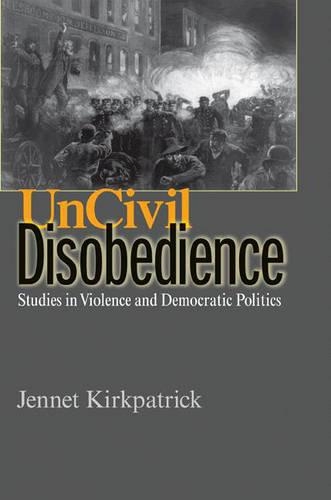
Uncivil Disobedience: Studies in Violence and Democratic Politics
(Paperback)
Publishing Details
Uncivil Disobedience: Studies in Violence and Democratic Politics
By (Author) Jennet Kirkpatrick
Princeton University Press
Princeton University Press
1st December 2008
United States
Classifications
Tertiary Education
Non Fiction
Political activism / Political engagement
Violence and abuse in society
303.620973
Physical Properties
Paperback
168
Width 152mm, Height 235mm
227g
Description
Uncivil Disobedience examines the roles violence and terrorism have played in the exercise of democratic ideals in America. Jennet Kirkpatrick explores how crowds, rallying behind the principle of popular sovereignty and desiring to make law conform to justice, can disdain law and engage in violence. She exposes the hazards of democracy that arise when citizens seek to control government directly, and demonstrates the importance of laws and institutions as limitations on the will of the people. Kirkpatrick looks at some of the most explosive instances of uncivil disobedience in American history: the contemporary militia movement, Southern lynch mobs, frontier vigilantism, and militant abolitionism. She argues that the groups behind these violent episodes are often motivated by admirable democratic ideas of popular power and autonomy. Kirkpatrick shows how, in this respect, they are not so unlike the much-admired adherents of nonviolent civil disobedience, yet she reveals how those who engage in violent disobedience use these admirable democratic principles as a justification for terrorism and killing. She uses a "bottom-up" analysis of events to explain how this transformation takes place, paying close attention to what members of these groups do and how they think about the relationship between citizens and the law. Uncivil Disobedience calls for a new vision of liberal democracy where the rule of the people and the rule of law are recognized as fundamental ideals, and where neither is triumphant or transcendent.
Reviews
"Kirkpatrick's study is rich in history and suggestive in its pursuit of other models for thinking about law's social meanings... Kirkpatrick's book is worth reading and pondering for the ways that it makes one connect American legal history to these pressing issues."--Jon Goldberg-Hiller, Law and Politics Book Review "The book features adept forays into jurisprudence at the same time that it captures the cultural diversity and local character of political violence in the US. Here the challenges posed by Thoreau and Rosa Parks become a platform from which to jump into the bloody world of John Brown and Timothy McVeigh. Kirkpatrick warns that conventional treatment of violence as outside of law is a sort of denial that leaves us vulnerable."--J. Brigham, Choice "[O]ne of the great strengths of this book is its ability to relate illuminating historical examples of uncivil and civil disobedience to a wider tradition of political and legal theory...This is an original, highly readable, and rewarding book."--April Carter, Perspectives on Politics "This well-written book not only provides significant insights into the motives of southern lynch mobs and others but also raises necessary and troubling questions about the nature of democracy in America. It is an important work that should be widely read."--Brent J. Aucoin, Journal of Southern History
Author Bio
Jennet Kirkpatrick is lecturer in political science at the University of Michigan.
